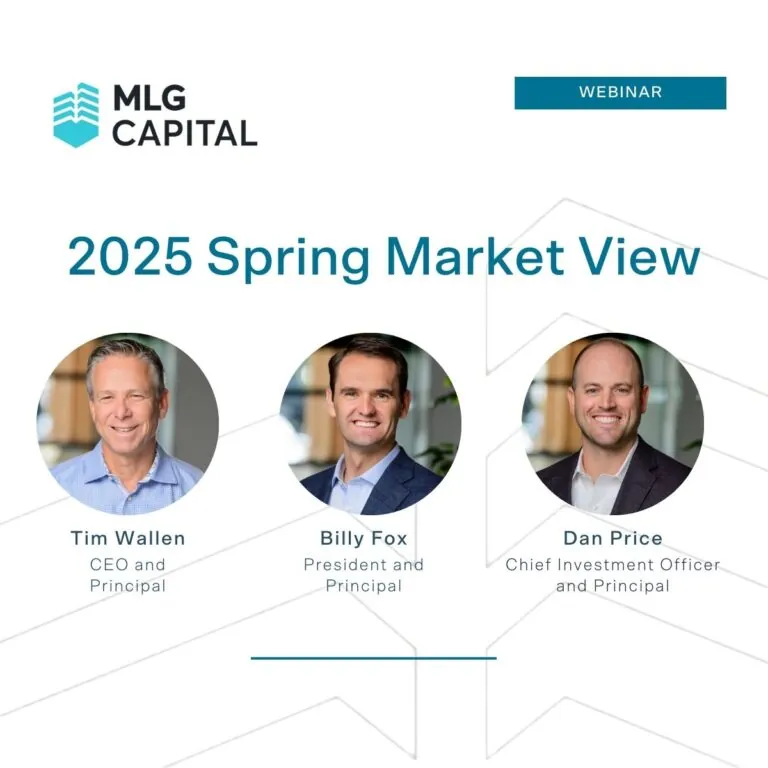August 21, 2025
Why You Should Consider Investing in Private Real Estate
Perhaps you’ve thought about diversifying your traditional portfolio and considered real estate as a potential solution. Or, maybe you’re only familiar with real estate investment trusts (REITs) as a form of real estate investing. The world of private real estate provides new, and in my opinion, strategic alternatives compared to simply investing in public REITs. In a world where everything feels like it’s been turned upside down, many investors take comfort in the familiarity and ease of stocks and bonds, but they may miss out on the opportunities and benefits private real estate offers. It’s been my experience that investors recognize the advantages to private real estate but are apprehensive to take the jump into investing due to the unfamiliarity of it. Investing in private real estate may offer benefits you may not find in a portfolio made up of REITS, stocks and bonds alone: Diversification Low correlation to public markets and less volatility Tax-deferred income Cash flow and long-term appreciation Let’s take a deeper dive: DIVERSIFICATION Geographic, asset type, and real estate manager diversification is a key part in creating a successful investment portfolio, as it has the potential to shield investors from added risk, and it can also preserve an investor’s capital. Many private real estate investments are done on a local basis, primarily investing in their local communities. Don’t get me wrong, this is great for the local market and community, but it doesn’t help to diversify an investment portfolio across asset classes and markets. With a private real estate fund, investors may be exposed to various...
August 19, 2025
The Tax-Efficient Power of Reinvestment
Private real estate is a tax-advantaged asset class. At MLG, we first focus on making smart real estate investment decisions, then wrap strategic tax planning around those decisions. One financial strategy our investors can take advantage of is the power of reinvesting over time. When one of our older funds produces a large distribution following the sale of a property, many of our investors consider making new investments into our newest fund. New investments generally create fresh tax losses that could be used to offset taxable income from prior funds within the same year. Illustrating the Tax Efficiency of Reinvestment To illustrate the power of reinvestment, let’s see what potential tax savings could occur from an investor using their proceeds from a distribution in an older fund to make a new investment into our latest fund offering. This scenario is hypothetical and is not representative of any investment offered by MLG. Additionally, it is always wise to consult your tax professional before making any investment decision. Let’s assume an investor made a $250k investment in a diversified private real estate fund. Let’s also assume that a property sale from such fund produced a return of capital of 20% of their original...
July 14, 2025
What the Enacted Tax Bill Could Mean for Real Estate and MLG Investors in 2025
At MLG Capital, we monitor legislative developments that could influence the real estate investment environment. One such development is the “One Big Beautfiul Bill Act, which introduces provisions with meaningful implications for real estate investors. Several newly passed elements are worth noting. These provisions may create opportunities for enhanced tax efficiency. As always, investors should consult with their personal tax advisors and evaluate them in the context of their individual financial situations. 100% Bonus Depreciation: Accelerating Deductions One beneficial aspect of the bill for real estate is the extension of 100% bonus depreciation. This provision allows for the immediate expensing of certain capital investments in the first year for qualified property acquired and placed in service after January 19, 2025. This results in real estate investments offering the potential to defer taxes due to allocations of losses to investors in early years of an investment. For example, in the context of MLG Capital’s Private Fund VII, we estimate that this may result in 2025 beneficial net rental losses of approximately 50-60%[1] as a percentage of capital contributed while also receiving nontaxable distributions. Assuming these losses are passive, which is the case for most Private Fund VII investors, they then must...
May 21, 2025
Market View 2025: MLG Capital’s Strategic Outlook for Private Real Estate
Each year, MLG Capital issues its Market View commentary to offer a clear, data– driven perspective on the state of the private commercial real estate market. In Spring 2025, CEO Tim Wallen, President Billy Fox, and CIO Dan Price convened to discuss market trends and where they see opportunity in the market today. The following highlights from our 2025 Market View discussion explore where we see risk, where we see resilience, and why we are actively deploying capital in the current environment. Key Themes from the Spring 2025 Market View Discussion Soft net operating income (NOI) is creating tactical entry points, not permanent impairments. Operating income across multifamily assets has come under short–term pressure due to record supply deliveries in 2023 and 2024, particularly in high-growth markets such as the Sunbelt. This temporary imbalance has generally reduced occupancies, flattened rent growth, and increased concessions. MLG views this softness not as structural deterioration, but as a cyclical occurrence that is already beginning to normalize in select markets. As operational performance recovers, assets acquired during this window may benefit from meaningful NOI growth over the mid– to long–term. The supply and demand imbalance is correcting and setting the stage for future...
April 15, 2025
Navigating 2025 Market Volatility: Why Private Real Estate May Offer Stability for Investors
The public markets are experiencing high volatility—driven by sweeping tariffs, geopolitical uncertainty, and investor anxiety around a potential economic slowdown. In this kind of environment, many high-net-worth investors are re-evaluating their asset allocation strategies. One increasingly popular question: Is it time to move beyond the public markets? While publicly traded REITs (Real Estate Investment Trusts) offer exposure to real estate, they behave more like stocks than the underlying real estate itself. This is because public REITs trade on exchanges and are subject to the same sentiment-driven swings as the broader equity markets. This disconnect highlights the key difference between public REITs and private real estate investments: private real estate is less correlated to public markets. At MLG Capital, we track and compare the performance of public equities, REITs, and private real estate using trusted benchmarks like the S&P 500, the IYR ETF (for public REITs), and the NCREIF Property Index (for institutional private real estate). Historically, and continuing into this volatile 2025 environment, private real estate has shown considerably lower volatility and less correlation with the ups and downs of the stock market. Overexposure to highly correlated, and currently volatile assets, may result in increased risk when compared with a...
April 11, 2023
Understanding the K-1: A Guide for Real Estate Investors
As an investor in a diversified private real estate fund, you have likely come across the term “K-1” and have wondered both what it is and what it means to you. The K-1 is an important tax form that every investor in a partnership, including a real estate investment fund like the series of MLG Private Funds, receives annually, and is a very important document needed for filing your taxes. Let’s break down what a K-1 is, and more importantly, how this document can impact real estate investors personal tax filings. What is a Schedule K-1? A K-1 is a tax form that is used to report a partner’s (investors) share of the income, deductions, credits, and other allocable items of a partnership. It is required to be filed by every partnership (including a real estate investment fund) with the Internal Revenue Service (IRS) and provided to each partner (investor) annually. The K-1 reports the investor’s annual share of the partnership’s taxable income and is used to prepare the investor’s individual tax return What information is included on a K-1? A K-1 form typically includes the following information (see an example 2022 K1 from the IRS): Your tax basis...
November 5, 2021
15 Questions to Ask Before Investing Your Money: Part 4
You’ve gathered enough information to make an informed decision about your manager. Now what? Consider how you might want to invest and the type of experience you want to have once you sign on with a specific manager. What Are the Tax Implications of My Investment? Some firms may have in-house tax staff, which can be advantageous for structuring investments to benefit their investors. These staff might also serve as a resource for you, once you invest, to answer questions about withholdings or other tax reporting. Compared to other types of investments, private real estate can offer many tax advantages. While tax efficiency should not be the sole driver of your investment decision-making, it is helpful to know how investing in private real estate might impact your tax situation or if it makes sense for your overall financial picture. It’s important to note that tax situations can vary from investor to investor, so it is best to discuss tax planning with a professional such as a CPA or tax attorney. Do You Accept IRAs or 401ks? While tax-advantaged investment vehicles such as IRAs and 401ks are typically invested in public equity, there are opportunities where these vehicles can invest in alternative...
October 21, 2021
15 Questions to Ask Before Investing Your Money: Part 3
I’m sure you’ve heard before that real estate is a relationship business. This is not only true when it comes to finding good deals, but it’s also true for managers working with new and prospective investors. Strategy and structure are critical for the performance of an investment in private real estate, but the success of a firm can give a manager a leg up on its competitors. While past returns are not indicative of future results, a track record is an important factor to look for in a real estate investment manager. Here are some questions to help guide your conversations when vetting a private real estate firm. How Has the Firm Weathered Market Cycles? In the past 30 years, the commercial real estate space has been through several major downturns that resulted in reduced demand for real property: “Savings and Loan Crisis” of the late 1980s, the “Dot Com Bust” and the resultant recession of the early 2000s, “The Great Recession” in 2008 and, most recently, the impact of the coronavirus pandemic in 2020. A firm that managed through these cycles and remained in business throughout these downturns, and subsequent recoveries, in the real estate market may indicate to you that it their...
October 14, 2021
15 Questions to Ask Before Investing Your Money: Part 2
In part one of this series, we outlined questions regarding the overall strategy of an investment in private real estate. Now, let’s focus on the structure. These questions will help you understand how the investment works and the impact it can have on your investment returns. How Does the Investor Get Paid? It’s important to dive in and understand the mechanics of how investors will be paid from the profits of the investment. Most structures distribute returns based on some sort of tiered waterfall system, which we will explore further below. Generally speaking, investors should seek to be compensated first and allow the sponsor to participate in the upside. Most times, after fees are paid, the first obligation of the sponsor is to give investors a preferred rate of return; said differently, 100% of the cash flow from the investment until investors have achieved a certain rate of return. The higher the preferred return rate, the better for the investor, as they have a priority on the cash flow until that rate of return is achieved. Please note that the preferred rate of return is not guaranteed. Investors should also seek for their preferred return (“pref”) to be accruing and compounding, meaning that if the sponsor does not...
October 6, 2021
15 Questions to Ask Before Investing Your Money: Part 1
As an alternative to the typical investments in stocks and bonds, real estate offers many opportunities for high-net-worth investors, family offices, and investment advisors. In addition to the standard due diligence of a specific investment opportunity, it’s important that investors also understand the intricacies of investing in any private real estate vehicle. This 4-part series will outline the core focus investors should consider and the types of questions to ask to make an informed decision before committing capital to an investment in private real estate. This article does not outline all considerations for investing in private real estate and prospective investors are encouraged to consult with their own investment, tax and legal advisors about investments in private real estate. What is the Investment Structure? There are many ways to organize a private real estate investment. Whether it’s an individual syndication, niche fund, diversified fund or other type of specialty structure, each provides a distinct set of opportunities and risks. An individual syndication, for example, is an investment in a single property. If you invest with a developer in a ground up multi-family development, and the project goes well, that investment could generate extremely attractive returns. However, because all of your...









